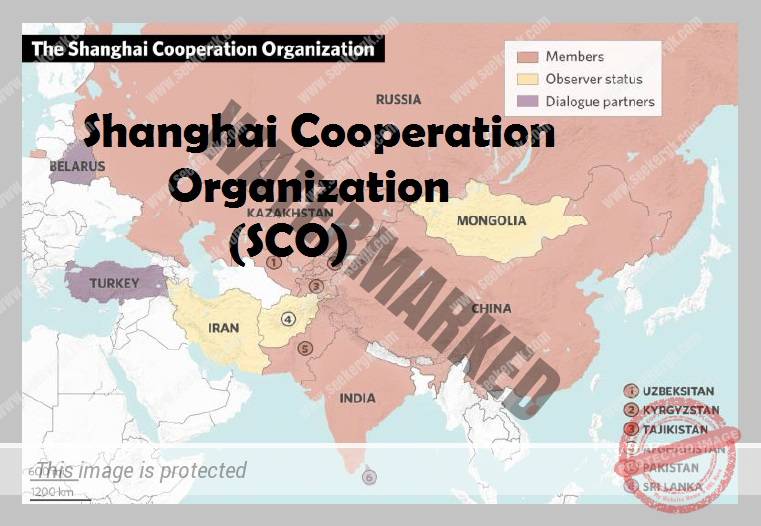
Shanghai Cooperation Organization (SCO) is a Eurasian intergovernmental mutual security, political and economic organization of 8 countries namely;
Members of Shanghai Cooperation Organization (SCO)
- China,
- Kazakhstan,
- Kyrgyzstan,
- Russia,
- Tajikistan,
- Uzbekistan,
- Pakistan, and
- India.
It came into being in 1996 at Shanghai in China in the name of Shanghai 5 (as the founding members were five namely, China, Kazakhstan, Kyrgyzstan, Russia, and Tajikistan).
However, its membership rose to 6 after inclusion of Uzbekistan in 2001 where its name was also changed to The Shanghai Cooperation Organization SCO.
Pakistan and India joined in 2017. India’s entry was pushed by Russia while that of Pakistan by China. At present, it represents 40% of humanity and around 20% of world GDP. Being a China-dominated security grouping, it is increasingly seen as a counterweight to NATO. Its secretariat is in Beijing, China. The working languages are Chinese and Russian. China, world’s 2nd largest economy, and other members of the organization with their vast reserves of oil, gas, and hydroelectricity resources give an important dimension to this organization. The observer states are; Afghanistan, Belarus, Iran, and Mongolia. The dialogue partners are; Armenia, Azerbaijan, Cambodia, Nepal, Sri Lanka, and Turkey. It appears that Turkey could be granted the status of a permanent member of SCO shortly for the reason that its relations with the USA may not remain that much cordial. It was in August 2018 that senate of USA approved a bill to block Mr. Erdogan’s government to take the delivery of 100 F-35 fighter jets in retaliation of its purchase of a Missile defense system from Russia.
The SCO was primarily focused on Central Asian security including separatist/extremist and terrorist movements and challenges, but its activities started giving due importance to the socio-economic development of the region with the passage of time. The Shanghai 5 signed “Treaty on deepening military trust in border regions” in Shanghai on April 1996 and “Treaty on the reduction of military forces in border regions” on April 24, 1997, in Moscow. The Council of Heads of states is the top decision-making body of the organization. It meets every year.
The SCO has a “Regional Anti-Terrorism Structure (RATS).” The SCO has carried out some joint military exercises. The first was held in 2003 in Kazakhstan. Another joint military exercise was held in Russia in which 4000 Chinese soldiers participated. The SCO also signed a “Collective Security Treaty” in October 2007 to broaden cooperation on issues relating to security, crime, and drug trafficking.
To strengthen their security Russia and China warplanes carried out joint air patrol for the first time in July 2019. Chinese army stationed in Tajikistan also carried out exercises there.
An agreement was signed to enhance economic cooperation by the SCO members on 23rd September 2003, and SCO free trade area agreement was signed in 2004. It was decided during 2005 Summit to prioritize joint energy projects relating to oil and gas sector, and joint use of water resources. Accordingly, the inter-bank SCO council was created to fund joint projects. In 2009, China announced plans to provide $ 10 billion in loans to SCO members to support their economies amid the ongoing global financial crisis.
Though the SCO declaration contains a statement that, “it is not an alliance directed against other states and regions” yet many political observers believe that SCO is mainly to counter NATO and contain the United States influence in the Central Asian states bordering Russia and China. In the past Iranian president in its speech at SCO Summit made verbal attacks against the U.S. When U.S. applied for observer status in the SCO in 2005, it was rejected.
After the dismemberment of Soviet Union when Warsaw pact was abolished in the early 1990s, the NATO remained intact; instead it embarked upon the project of its expansion Eastward by including East European (Previously Warsaw Pact counties into its ambit).
When the then American Secretary State was asked why the NATO had not been abolished in response to the abolishment of the Warsaw Pact, she replied, “NATO does not need any enemy for its existence.” This all throws sufficient light on the background expediencies for the geneses of SCO; which indeed take into consideration the challenges posed by NATO and response to the same by associating the Eastern States of Russia, i.e., China, and the Central Asian States instead of looking westward this time.
After inclusion of Baltic States of Lithuania, Latvia and Estonia into NATO the borders of NATO have gone up to the borders of Russia. It was in this background that Russian president announced in 2008 that Russia could aim nuclear missiles at Ukraine (country bordering Russia) if it also joins the NATO and become part of U.S. missile defense system. In 2005 SCO also asked the U.S. to set a timetable to withdraw its troops from Uzbekistan and Kirgizstan.
However, SCO during the 2012 Beijing Summit rejected military intervention as a means to resolve international issues. It opposed military intervention in Syria and rejected the idea of ‘by force regime change’ in Syria. It also criticized the NATO bombing in Libya to drive out the previous government. The leaders also observed that the overthrow of the Taliban government in Afghanistan could not bring peace even after the lapse of more than a decade.
Therefore they believe that time has come to say ‘No’ to ‘military intervention’ as ‘choice strategy’ to establish peace in the world. This SCO Summit for the first time came out with a united stand on major international issues.
It would not be out of place to mention here as stated by Noam Chomsky in one his speeches that a verbal surety was given to Mikhail Gorbachev that NATO would not move even an inch towards East if Gorbachev agreed to the unification of Germany. But after the collapse of Soviet Union, we have seen the violation of that verbal promise. That is the real game that goes on in the world and will go on in the future as well. Establishment of SCO could also be viewed in this background.
As regards NATO expansion it is a preemptive strategy of the Western powers to check Russia from moving into Eastern European nations any time in future if it gets strong enough to do so.
The 13th SCO Summit, held in Bishkek, Kyrgyzstan in 2013, was focused on the security situation in Afghanistan if NATO forces withdraw from Afghanistan by the end of 2014. It was stated that since the activities of terrorists and extremists were still going on, therefore, the SCO must support Kabul in its efforts to revive the country. The Russian president stated that Iran just like any other member of the international community had the right to develop and use nuclear power for peaceful purposes.
Concerning Syrian issue, it was stated that military involvement should only be possible with the consent of the Security Council, and after the exhaustion of all diplomatic means. They also welcomed the Syrian stand to join a global ban on chemical weapons. The Bishkek summit concluded with the joint declaration stressing upon the need to take collective action to fight out terrorism, extremism, separatism, drug trafficking, and other transnational threats. The declaration also included a collective stand on Syrian issue concerning honoring the country’s sovereignty and need to put Syrian chemical weapons under international control. It also stressed for closer investment partnership, further cooperation in innovative technologies, agriculture, transport and communications, and working for launching SCO Development Bank.
SCO Summit 2018, Qingdao, China: A firm commitment was expressed to achieve the tasks laid down in the SCO development strategy until 2025. SCO was noted as a unique, influential and authoritative regional organization whose potential has been increased after the inclusion of Pakistan and India. A plan of action for 2018-2022 was approved to implement the treaty on long-term neighborliness, friendship, and cooperation between SCO member states. It advocated the settlement of the crisis in Afghanistan, Syria, the Middle East, and the Korean Peninsula within the framework of agreed principles of international law. It also noted the importance of steady implementation of the joint comprehensive plan of action on the Iranian nuclear program.
It was reaffirmed to facilitate the political interaction among the member states to oppose terrorism, separatism, and extremism for 2019-2021. The summit supported the initiative of Uzbekistan to approve a special General Assembly resolution on education and religious tolerance. They also reaffirmed the commitment to the central role of UNO in implementing the Global Agenda for Sustainable Development. They stressed the importance of strengthening and developing the multilateral trade system as enshrined in the WTO to form an open world economy.
They adopted the SCO concept on environmental protection. Kazakhstan, Kyrgyzstan, Pakistan, Russia, Tajikistan, and Uzbekistan reaffirmed their support for China’s BRI and approved the efforts to implement the same jointly. The SCO summit 2019 was held in Bishkek the capital of Kyrgyzstan. Chinese President Xi Jinping called for member states to build a closer community with a shared future. The leaders attending the summit issued a joint communique aiming to boost cooperation in diverse fields including security, trade and agriculture. Further, how can they maintain security over the Eurasian landmass.
As per some Analysis In November 2005, the Russian Foreign Minister stated that the SCO was to establish a rational and just world order. Further, SCO was to provide an opportunity to take part in formulating a fundamentally new model of geopolitical integration.
Some of the geopolitical analysts predict that SCO is expanding towards the Persian Gulf after granting Iran, and Afghanistan the status of observers and making Pakistan as its permanent member. The SCO is therefore observed as a response to the United States long-term presence in Japan and South Korea, and strong ties with Thailand and Philippines in the periphery of China.
With its growing economic power and it’s already established nuclear capability the SCO is undoubtedly going to be a world key force to counter and balance the American influence and power. Russian stand in 2014 against American decision to attack Syria testifies the same.
However, according to a European parliament researcher, the institutional weaknesses, a lack of common financial funds for the implementation of joint projects and some conflicting national interests could prevent the SCO from achieving a higher level of regional cooperation.
SCO though ostensibly formed to curb extremism in the region and enhance border security, but most probably the real objective is to counterbalance the activities of the U.S. and NATO in Central Asia. Additionally, in future SCO will be very much instrumental in countering and neutralizing the effect of any sanctions imposed by the USA and its allies against their adversaries.




Thank you!
Pingback: Know Everything about SAARC (South Asian Association Regional Cooperation) – SeekerGK